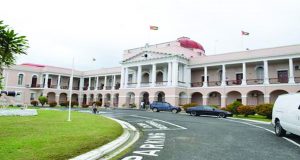Budget must stimulate economy
Budget 2017 will be presented today and, by the consensus of most stakeholders, its main challenge will be to jump start our moribund economy. What is immediately needed is a directed intervention to stimulate the economy via all the monetary and fiscal tools at the disposal of modern governments and deployed routinely by the US and other “free enterprise economies”.
The Private Sector Commission (PSC) proposed some of these when it called for a permanent reduction of the corporate and personal income tax rate, over 10 years, to 20 per cent and an increase in the income tax threshold to $100,000 per month. These measures would immediately make income available to businesses and individuals, which experience in other jurisdictions has shown will generally be ploughed back into investment and purchases to give a fillip to other businesses.
The PSC also called for Government intervention to give relief to the massive loans that are outstanding in the rice industry occasioned by the depressed prices for rice and paddy subsequent to the Government’s refusal to engage the Government of Venezuela for an extension of the lucrative rice-for-oil deal under the PetroCaribe Initiative. The taxes on inputs in the rice industry – including diesel fuel – in our estimation, should also be lowered or the industry will certainly shrink massively in the next crop.
The other interventionary measure is to catalyse a stratum of entrepreneurs and businessmen who will be willing to take the necessary risks to establish service or production companies that can compete and export in the global economy. Towards this end, the PSC also called for the Government to reduce income taxes for companies that create new employment in all value-added sectors. More pointedly, it has reminded the Government that infrastructural projects are critical in stimulating the modern economy and, in fact, Donald Trump in the US promised that this measure will be central to his economic revival of his country’s economy. In Guyana, the Amaila Falls Hydroelectric Project comes to mind as one that the Government has sidelined even though it is central to Guyana’s ultimate development hopes in the short term.
In all of the industrialisation of firstly England, then the USA, followed by Japan, the Far Eastern Tigers, China and now India, all of their Governments facilitated the growth of businesses because this ultimately benefited the entire populace and economy. But in Guyana, there is a very unhealthy development unfolding in reference to the oft-announced national goal of higher growth rates. The Government has continued with its old Opposition tactic to insidiously undermine the premise underlying every successful business entity and indeed every successful economy – the imperative to generate profits.
Even though the Government has committed since 1989 to the proposition that businesses shall be “the engine of growth”, the new Administration is proceeding as if the “engine” does not need rails to pull the economy forward. “Successful businesses” mean that those businesses will have to generate profits and this means that the owners, whether individuals or shareholders, will become wealthier. Businesses should not have to apologise for this.
Secondly, we have pointed out the nexus between governments and successful world-class companies in the modern high-flying, export-oriented economies. Even in the US, the role of Wall Street is acknowledged. This is inevitable: how can the engine and driver not be in communication and be responsive to their mutual needs? The rice industry cannot be thrown under the bus under some misguided notion that “Governments cannot intervene in marketing”. Rice is exported and export means foreign currency to develop the country.
It is axiomatic that business must be regulated to further the overall societal good. But businesses cannot then be castigated for legally making profits within those regulations. The business community has been surprisingly apathetic and unresponsive to the refusal of the Government to both stimulate the economy and to foster entrepreneurship for export-led growth.

